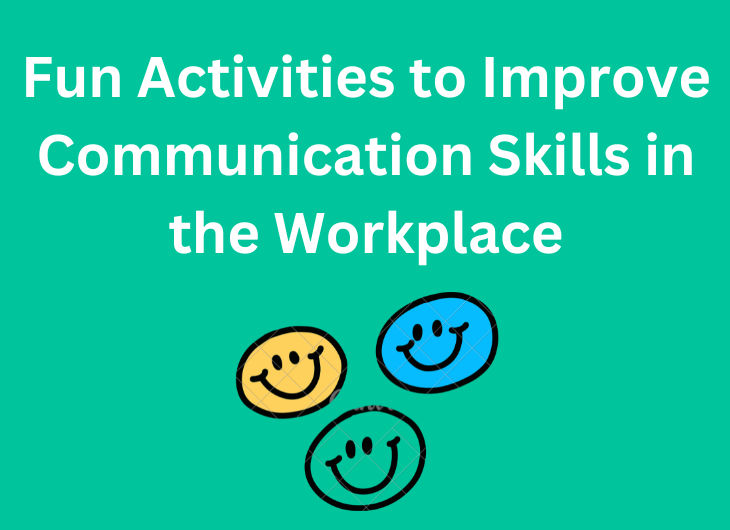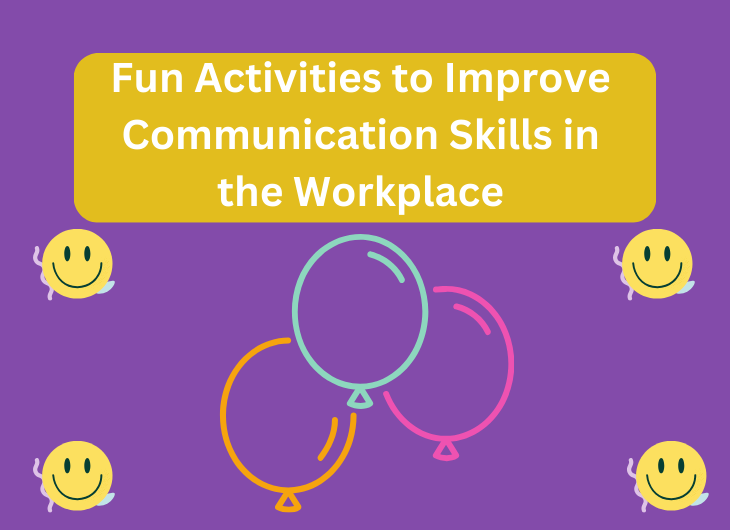20 Best Fun Activities to Improve Communication Skills in the Workplace
Effective communication is the backbone of a successful workplace. It enables teams to collaborate efficiently, fosters a positive work environment, and helps everyone understand their roles and responsibilities better. However, improving communication skills doesn’t have to be a tedious task. In fact, it can be a lot of fun! In this blog, we’ll explore various enjoyable activities that can enhance communication skills among coworkers.
1. Storytelling Sessions:
Storytelling is a powerful way to improve verbal communication. Organize storytelling sessions during lunch breaks or team meetings where employees share personal anecdotes or stories related to their work experiences. This not only enhances public speaking skills but also strengthens interpersonal connections.
2. Two Truths and a Lie:
This classic icebreaker game is a fantastic way to improve listening skills and encourage open communication. Each participant shares two true statements and one false statement about themselves. Colleagues take turns guessing which statement is the lie, leading to amusing revelations and increased understanding among team members.
3. Communication Bingo:
Create bingo cards with various communication-related tasks or challenges, such as “give a compliment to a colleague,” “ask for feedback,” or “express gratitude.” Encourage employees to complete these tasks throughout the week. The first to complete a line on their bingo card wins a prize, making it a fun competition that promotes communication.
4. Group Storytelling:
Gather a group of colleagues and have each person contribute one sentence to a story. The catch is that they can only see the previous sentence, not the entire story. This activity fosters active listening and encourages participants to adapt their communication style to maintain the story’s flow.
5. Role Reversal:
Pair employees from different departments and have them swap roles for a day. This allows them to gain a deeper understanding of each other’s responsibilities and challenges. It also promotes empathy and better communication between teams.
6. Pictionary or Charades:
Engage in a game of Pictionary or Charades using workplace-related terms or scenarios. These classic games encourage non-verbal communication and teamwork as participants must rely on gestures and drawings to convey their messages.
7. Lunch and Learn Sessions:
Host regular “Lunch and Learn” sessions where employees take turns presenting on various topics of interest, both work-related and personal. This practice enhances presentation skills and encourages active listening and knowledge sharing.
8. Mindful Communication Exercises:
Incorporate mindfulness into the workplace by organizing short meditation or deep breathing sessions before meetings. This helps employees clear their minds and be more present during discussions, leading to more effective communication.
9. Team-Building Workshops:
Invest in team-building workshops and activities focusing on communication, such as trust falls, problem-solving challenges, or escape rooms. These experiences promote collaboration and strengthen interpersonal bonds, which are essential for effective communication.
10. Communication Skills Training Games:
Utilize interactive games and simulations designed to enhance communication skills. Online platforms offer various options, such as virtual escape rooms or business communication role-play games, which can be both educational and enjoyable.
11. Feedback Fridays:
Designate one day a week as “Feedback Friday” where employees share constructive feedback with one another. This practice encourages open communication and helps individuals identify areas for improvement.
12. Creative Brainstorming Sessions:
Instead of traditional brainstorming, opt for creative alternatives like “brainwriting,” where team members write down ideas on paper and pass them around for further development. This technique ensures that everyone’s ideas are considered and enhances collaborative communication.
13. Communication Challenges:
Create fun challenges related to communication, such as “no email day” or “one-sentence emails only.” These challenges encourage employees to explore alternative communication methods and think critically about their interactions.
14. Story Circles:
Gather in a circle and start a story by having one person say a sentence. The next person adds to the story, and so on, until it comes full circle. This activity encourages active listening and the ability to build upon others’ ideas.
15. Speed Networking:
Organize speed networking sessions where employees have a limited time (e.g., 2-3 minutes) to introduce themselves and discuss their roles with different colleagues. It’s an excellent way to practice concise communication and broaden professional networks.
16. Team Challenges:
Create friendly competitions among teams, where they need to complete tasks or solve problems by communicating effectively. These challenges can include building structures with limited verbal communication or solving puzzles collaboratively.
17. Communication-themed Board Games:
Bring in board games like “Codenames” or “Dixit,” which require players to communicate effectively and interpret non-verbal cues. These games not only provide entertainment but also enhance communication skills.
18. TED Talk Tuesdays:
Encourage employees to watch and discuss TED Talks related to communication, leadership, or personal development. This can spark insightful conversations and inspire individuals to improve their communication skills.
19. Show and Tell:
Designate a day where employees can bring in an object or share a hobby or interest outside of work. This activity promotes active listening and provides opportunities for colleagues to connect on a personal level.
20. Communication Journaling:
Encourage employees to maintain communication journals where they reflect on their daily interactions, noting what went well and what could be improved. This practice fosters self-awareness and continuous improvement.
FAQs: Fun Activities to Improve Communication Skills in the Workplace
1. Why are communication skills important in the workplace?
Effective communication skills are crucial in the workplace for several reasons. They facilitate a clear understanding of tasks, expectations, and goals, promote collaboration among team members, reduce misunderstandings and conflicts, and create a positive and productive work environment.
2. Can these activities be adapted for remote or virtual teams?
Yes, many of these activities can be adapted for remote or virtual teams. For instance, you can use video conferencing platforms for virtual storytelling sessions, communication bingo, or online team-building workshops. Virtual escape rooms and online communication role-play games are also great options.
3. How often should these communication activities be conducted in the workplace?
The frequency of these activities can vary based on your team’s needs and preferences. Some activities, like “Two Truths and a Lie” or “Communication Challenges,” can be incorporated into daily routines, while others, such as team-building workshops or “Feedback Fridays,” can be scheduled on a monthly or quarterly basis.
4. What if some employees are shy or uncomfortable with these activities?
It’s important to create a safe and inclusive environment where employees feel comfortable participating. Encourage participation without pressure, and provide options for individuals to contribute in ways that suit their comfort levels. Over time, as trust and rapport build within the team, shyness may naturally decrease.
5. Are there any specific communication skills that these activities target?
These activities can target various communication skills, including active listening, public speaking, non-verbal communication, empathy, conflict resolution, and effective written communication. Different activities emphasize different skills, so you can choose those that align with your team’s needs.
Conclusion: Fun Activities to Improve Communication Skills in the Workplace
Effective communication skills are vital in any workplace, and the journey to improving them doesn’t have to be dull or intimidating. By incorporating fun activities like storytelling sessions, Pictionary games, role reversal, and many others, you can foster a more open, engaged, and communicative work environment. These activities not only enhance specific communication skills but also strengthen teamwork, trust, and understanding among colleagues. They encourage individuals to step out of their comfort zones, become better listeners, and communicate more effectively with their peers. Remember that communication is an ongoing process, and these activities should be integrated into your workplace culture consistently. As employees become more adept at communicating, you’ll likely see increased productivity, reduced conflicts, and a happier, more engaged workforce.
Visit the link to read more: https://family-fitness-fun.com/which-fitness-exercise-is-best-for-weight-loss/





